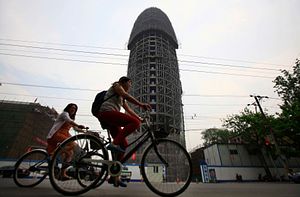A TV network headquarters that resembles a pair of pants. A newspaper headquarters that bears more than a passing similarity to an erect phallus. An arts center that has been described as a “group of space eggs.” These are just a few of the most famous examples of the many ridiculous looking buildings that have proliferated in China over the last decade. In new guidelines laid down this February, however, China’s State Council declared that “bizarre architecture” that isn’t “economical, functional, aesthetically pleasing or environmentally friendly” will be banned. While this decision will no doubt be welcomed by both defenders of good taste and Chinese citizens weary of official extravagance, it is also emblematic of a worrisome fixation on rectifying external appearances, while leaving underlying problems untouched that has marked Chinese President Xi Jinping’s highest profile initiative.
In 2013, Xi launched a far-reaching anti-corruption campaign that contained the famous promise to target both high-level “tigers” and low-level “flies.” While many have argued that the campaign is politically motivated – noting, for example, that many high-level officials targeted have been associated with Xi’s political rivals and that his protégés and allies have gotten off lightly – it is clear in many of the accused were in fact guilty of bribe-taking, profiteering, cronyism, and various other offenses. However, even if one assumes that Xi is acting out of a desire to rid the Communist Party and Chinese state of endemic corruption, rather than looking to consolidate his political power, the means he has chosen are tailored to achieving short-term results. By arresting huge numbers of officials for corruption, Xi has greatly curtailed the public displays of ostentation that once were common among the party leadership, high-ranking government officials, and well-connected businesspeople. This is a positive development in the eyes of Chinese citizens, who are understandably revolted at the idea of paying for government officials to cavort with prostitutes, purchase luxury real estate, or spend massive amounts of money on unconventional looking buildings.
However, this sort of ostentation, odious though it may be, is a symptom and not a root cause. There are many proposed causes of corruption, but the fundamental defense against corruption is a predictable and independent judicial system where no individual or organization is above the law. Since coming to power, Xi has made frequent use of the phrase, “依法治国,” which is often translated, imprecisely, as “rule of law.” However, the term in China does not refer to the sort of independent legal system described above, but rather, in the words of Jiang Zemin, to the principle that “socialist democracy is gradually institutionalized and codified so that such institutions and laws will not change with changes in the leadership.” Put simply, it is meant to prevent the individual leaders from acting against and without regard to the country’s law rather than to guarantee the existence of an independent court system. While this is a worthy goal, meant to avoid a repeat of the toppling of China’s laws by Mao Zedong during the Cultural Revolution, it has little to do with preventing corruption.
Clear evidence of the disconnect between the goal of eradicating corruption and the reality can be seen in the ongoing crackdown on human rights lawyers that has taken place under Xi. First, many of those detained rose to prominence by exposing corrupt government officials. While the current anti-corruption campaign has emboldened ordinary citizens to call out officials who are blatantly corrupt, lawyers have in the past played a key role in unraveling schemes that are more opaque. More importantly, the crackdown signifies that the Party leadership sees the court system as an agent of state control above all else. As long as that continues to be the case, the rule of law will remain on the sidelines of the anti-corruption struggle.
Jonathan Hall-Eastman is a graduate of Rutgers University, currently studying at the Hopkins-Nanjing Center.

































